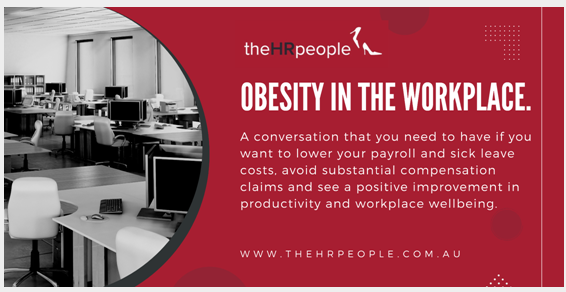Obesity in the workplace - your obligations

Obesity- and your obligations
“We need to talk about your weight” is not a conversation that anybody wants to have with an employee – but it is one you are now obliged to have by law.
With a hefty 28% of Australians classified as obese (and a further 36% classified as overweight), obesity is now one of the biggest issues that employers face.
From the point of view of the latest health and safety legislation alone you have two different legal duties:
- If you have an employee whose weight could be a hazard or health and safety risk then you must – by law – eliminate the risk of them hurting themselves or someone else. Failure to do so could cost you dearly in fines or compensation claims.
- As an employer you are now legally required to play a role in tackling workplace health issues such as obesity. The workplace is seen as a major contributing factor to a person’s weight and you are legally obliged to ensure that you are minimising those causal risks and addressing the weight issue.
How tackling the topic of employee weight could be a boost to your bottom line and have a positive impact for your workforce
And it’s not just about the legal obligation. While many people think that tackling the obesity issue is little more than a waste of time and money and a legal tick-box exercise, a few smart employers are waking up to the positive potential of having a fitter, happier workforce.
Consider, for example, the following few facts for a minute:
- Obese workers reportedly take a staggering 88% more sick leave.
- Overweight employees are far more prone to health problems such as cardiovascular disease, type 2 diabetes, back pain, mental health problems and general fatigue.
- Obesity is associated with a 25% higher risk of work-related injury – and medical claim costs are 5.3 times greater for obese employees.
- Research also shows that overweight employees generally result in a formidable loss of productivity for the employer.
Now, if we assume that your own workforce conforms to average figures for Australians and nearly 28% of your workforce are obese (and a further 36% overweight)…
What does that mean in terms of higher health and safety risk, financial loss to sick leave, compensation pay outs and reduced overall productivity for your business?
Or let’s look at it in a different way: What difference could it make to your business if everybody was 20 pounds lighter, fitter and healthier and came to work with a spring in their step instead of dragging themselves around the workplace?
But is there really anything an employer can do about the problem?
- The reasons why so many corporate health and wellness programs don’t work – and the 6 essential elements you must include.
- What you need to carefully consider BEFORE you have that tricky conversation with an overweight employee.
- Why you MUST carry out Fitness for Work Examinations and create Inherent Requirement descriptions for each role.
- Understand your legal obligations as an employer to obese workers and their colleagues to reduce the risk they cause in your workplace.
- How to avoid a discrimination claim when approaching that delicate conversation with an overweight worker.
- Why health checks are only an effective way to address the issue when used in conjunction with other health plans – and how to get those conversations and processes started.
- Is it possible to terminate the employment of a worker because of their weight and how would you go about it?
- Three things you must do if you engage shift workers to increase health and fitness.
- Three smart and easy steps to help ensure that prolonged sitting does not lead to health problems that could be painful for your staff and expensive to your business.
If you’d like to learn about your legal obligations and the effective measures you can take to successfully tackle this growing workplace problem, The H.R. People can help. They have read the Obesity Report and can assist you to implement the necessary requirements for your business. Contact Karen Vercoe from The H.R. People to discuss.
© Blog Copyright 2022 Karen Vercoe The H.R. People. All rights reserved. Brought to you by Robert Goodman Accountants.









